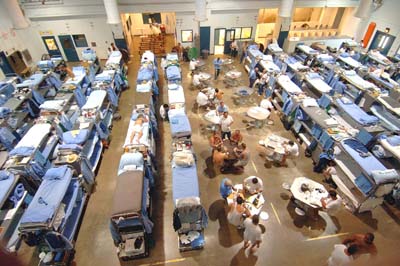American states spent about $52 billion on corrections last year, the vast majority of it on prisons, and that's not smart, the Pew Center on the States said in a report released Monday. As a cost saving measure in a time of fiscal crisis at the statehouses, states should instead emphasize spending on community corrections.

The rates of correctional control vary by race and geography. One in eleven black adults (9.2%) are enjoying the tender mercies of the state, compared to one in 27 Hispanics (3.7%) and one in 45 whites (2.2%). With one of every 13 adults behind bars or on probation or parole, Georgia has the highest percentage of its population under surveillance, followed by Idaho, Texas, Massachusetts, Ohio, and the District of Columbia.
"Violent and career criminals need to be locked up, and for a long time. But our research shows that prisons are housing too many people who can be managed safely and held accountable in the community at far lower cost," said Adam Gelb, director of the Center's Public Safety Performance Project, which produced the report.
But while prisons account for about 90% of the overall correction budget in the states, two-thirds of offenders are on probation or parole, not behind bars. Pressures to cut community corrections spending in the current crisis are penny wise but pound foolish, said the report.
"New community supervision strategies and technologies need to be strengthened and expanded, not scaled back," Gelb argued. "Cutting them may appear to save a few dollars, but it doesn't. It will fuel the cycle of more crime, more victims, more arrests, more prosecutions, and still more imprisonment."
The study recommended that states:
- Sort offenders by risk to public safety to determine appropriate levels of supervision;
- Base intervention programs on sound research about what works to reduce recidivism;
- Harness advances in supervision technology such as electronic monitoring and rapid-result alcohol and drug tests;
- Impose swift and certain sanctions for offenders who break the rules of their release but who do not commit new crimes; and
- Create incentives for offenders and supervision agencies to succeed, and monitor their performance.
The report did not address the role of drug prohibition in swelling the nation's prison population, nor did it question whether drug offenders should be arrested in the first place, let alone placed under state surveillance or imprisoned.
This work by StoptheDrugWar.org is licensed under Creative Commons Attribution-ShareAlike 4.0 International
Comments
RE: Incarceration
You are absolutely correct. Much more is needed in dealing effectively with this important issue. I believe that the Senator Webb is addressing the symptoms and not the causes. The causes are embedded in our poor school systems. We should be able to identify children with learning differences, remediate their disabilities and afford them the opportunity of becoming contributors to our communities. As for those already incarcerated, we have to identify their learning disability (65% of those incarcerated are learning disabled), remediate their learning disability and provide meaning job training so that they will be able to have good employment opportunities once they are released from prison. Yes, much more needs to be done. Address the causes.
RE: Incarceration: Too Many Americns behind bars
Regretably, the good Senator from Virginia is addressing the symptoms rather than the cause. The root cause of this issue is embedded in the inferior education that we are providing are children and especially minority children. Even more to the point, our school systems have failed regularly in recognizing children with learning disabilities and offerring corrective, intermediate remediation. These children are overlooked in the schools. They become bored or discouraged or worse, they are belittled by those who are supposed to be teaching them. When a child with some type of processing disorder or dyslexia is treated in such a way, there is no incentive for them to stay in school. The lure of the "streets" is much more compelling than a dull, lifeless classroom. Just because a child may have a learning disability, it does not mean that they are not intelligent. Rafel Edmunds was profoundly dyslectic, yet, he ran one of the largest and most ruthless crime gangs in the history of Washington, D.C. He is bright, articulate and a great organizer, Without the appropriate challenges and direction in the school system, he went to the streets and his life was filled with crime.
We have the opportunity of identifying and remediating these children before they become discouraged in school and look to the streets. These students can be remediated; they can go to the best of colleges: and, they can become real contributors in our communities.
THose in prison represent another challenge. As many as 65% of those incarcerated have a learning disability. These prisoners have to be identified and offerred meaning remediation and additional training so that when they are released they will be able to get meaningful employment. These efforts must be undertaken or else these men and women will soon be returning to the penal system. Without remediation and training, it is an endless cycle.
The cost of identifying, remediating and educating our children is significantly less than housing them in a prison for one year. This is cost justifiable.
This is the root cause. Let us not continue to pursue efforts to address our problems by addressing the symptoms. We must understand the causes and address the cause.- the answer lies within .
Add new comment